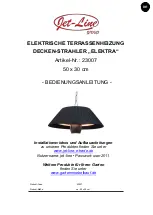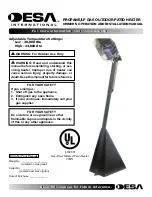
11
Choosing Installation Site
Chapter 3. – Safety Requirements
State of California:
The water heater must be braced, anchored or strapped to avoid moving during an earthquake. Contact local utilities for
code requirements in your area or call: 1-866-766-7489 and request instructions.
The Commonwealth of Massachusetts:
1) This water heater can only be used in outdoor applications if the usage is restricted to summertime
usage exclusively.
2) The water heater can be used for hot water only and not in a combination of domestic and space heating.
• Install the water heater in a location where it is free from obstacles and stagnant air.
• Consult with the customer concerning the location of installation.
• Do not install the water heater near staircases or emergency exits.
• Install the water heater in an area that allows for the proper clearances to combustible and
non-combustible construction. Consult the rating plate on the appliance for proper clearances.
• Do not install the water heater in a place where it may be threatened by falling objects, such as
under shelves.
• The water heater must be installed in a place where supply and exhaust pipes can be installed as
directed.
• Do not install the water heater where the exhaust will blow on outer walls or material not resistant
to heat. Also consider the surrounding trees and animals. The heat and moisture from the water
heater may cause discoloration of walls and resinous materials, or corrosion of aluminum materials.
• Do not locate the vent termination directed towards a window or any other structure which has
glass or wired glass facing the termination.
• Avoid installation where the unit will be exposed to excessive winds.
• Avoid installation above gas ranges or stoves.
• Avoid installation between the kitchen fan and stove. If oily fumes or a
large amount of steam are present in the installation location, take
measures to prevent the fumes and steam from entering in the
equipment.
• Install in a location where the exhaust gas flow will not be affected by fans
or range hoods.
• Take care that noise and exhaust gas will not affect neighbors. Avoid
installation on common walls as the unit will make some operational
noises while it is running.
• Before installing, make sure that the exhaust flue termination will have the
proper clearances according to the National Fuel Gas Code (ANSI
Z223.1-latest edition) or the Natural Gas and Propane Installation Code
(CSA B149.1).
CAUTION
be installed as directed.
Do not install the water heater where the exhaust will blow on outer walls or material not resistant to heat. Also
consider the surrounding trees and animals.
The heat and moisture from the water heater may cause discoloration of walls and resinous materials, or corrosion
of aluminum materials.
Summary of Contents for NRCP111-DV
Page 51: ...51 Memo...












































